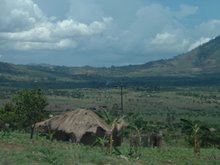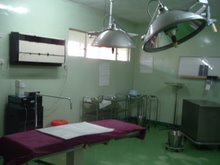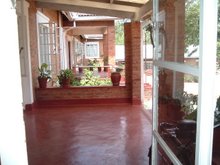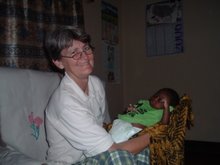To Malamulo Hospital (apparently, it translates to Commandments) today. Have photos of the OR (see the sidebar), including the lovely scrub sinks, and the buckets full of water because there is no running water today, pepani.
I didn't take photos of the hospital itself, because lovely as it is, photos can't do it justice. Colonial redbrick, 100 years old. Low buildings with covered walkways hemed in by arched 'windows,' vines and bougainvillea and all manner of well-kempt greenery.
The clinical officers were Jane from Kenya, a matter-0f-fact woman about my own age, and Blessings, a local young man, bright and attentive. They have minimal training but manage admirably at the front lines, undoubtedly better than I could running a ward without support at this point.
The cases were routine, two ladies with ovarian cysts; one had evidence of old PID in the form of extensive adhesions. Young as she is, her fallopian tubes appear to be so damaged that she is likely never to concieve, a disaster in a place that values a woman's fertility above most anything else.
We also visited Thyolo District Hospital which was under construction with the aid of Medecins Sans Frontieres while I lived here in the past (Hi Ibrahim, I wonder where you are and what you are doing, you jerk.). It's amazing, clean and modern yet very much fitting the environment. Fantastic. And they have a CD4 cell counter.
You see, people who test HIV positive in the absence of CD4 cell counts are not eligible for antiretroviral treatment until they get sick, WHO class III or IV. In limited resource settings this makes sense, saving the resources for the people who need them most. Unfortunately, some people in these categories are too sick to tolerate the ARVs; we have two patients at least who are in that situation. With CD4 cell counts, people in classes I and II may become eligible if they have a CD4 count under 200.
But a counter costs thousands of dollars in initial outlay and then in reagents and maintenance, so it is largely out of the reach of Mulanje Mission Hospital. They await with bated breath the introduction of the rumoured machine which can do the counts on a drop of blood and costs around $5000 instead of $20 000.
And maybe then the cracks through which our two ladies have slipped will narrow, and people after them will have a better chance at getting the drugs when they need them, before it is too late.
2006-11-29
Subscribe to:
Post Comments (Atom)














No comments:
Post a Comment